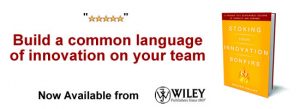Optimizing Innovation – Dr. Daniel Sturman of Google
 We are happy to bring you some of the key points and insights from Dr. Daniel Sturman’s talk at the Optimizing Innovation Conference, which was held October 21-22, 2009 in New York City.
We are happy to bring you some of the key points and insights from Dr. Daniel Sturman’s talk at the Optimizing Innovation Conference, which was held October 21-22, 2009 in New York City.
Dr. Daniel Sturman, Engineering Director at Google, spoke from an engineer’s perspective, not from an innovation director’s perspective, about the culture at Google. The main key in his mind?
Make sure you have good people, that they know what direction you’re going in, and then as a manager, try to get out of the way:
- Rich and broad mission scope
- Tolerance of failure and encouragement of risk-taking
- Decentralized action towards a commin mission and platform
- Technical leverage (cloud computing)
The Google approach to managing people and launching and iterating, may very well not be applicable to other areas, but it’s what they do. Dr. Sturman talked about how he wouldn’t necessarily want his surgeon launching and iterating.
From his experience, there was no master plan to Google from 2001 to 2009:
- Many ideas large and small were tried and abandoned
- What worked was defined by user excitement
- We focus on launch and iterate, and fail early and often, because often our first conception of what the user wants were wrong
“Usage is the currency that speaks – not what customers say they will use”
To help them figure out which ideas will succeed and which will not, Google does a lot of live experiments on the Google site – re-routing a small portion of their traffic to experimental parts of the site (as little as .1% of the traffic).
Dr. Sturman feels that having a strong and flexible technical foundation is key to Google’s success. This means easy access to hardware resources – rather than machines belonging to a certain group or having to requisition things through a restrictive process.
Google has the advantage of low experimentation costs – because they’re in the online services business and have lots of servers. Dr. Sturman referred to the Google portfolio as “shared warehouse computing”.
Also key is that all the pieces of code (with very few exceptions), are available to everyone in the organization.
“When in doubt, always move towards empowerment”
Management sets the tone:
- How important is control?
- I have 25 direct reports, some with the same spans of control
- This makes it almost impossible for me to be a control freak
- I can’t possibly know exactly what everyone is doing
- A rational organization can often rationize away innovation
- Accountability must be balanced
- Some chaos can be a good thing!
- Technnology in lieu of hierarchy
- Communication can enable flatness
- Small teams (say 8 people) and a flat heirarchy are good
- Peer driven evaluation and promotion
- If peers don’t think your work is important, but boss does, you’re not going to be promoted
- peer opinions are almost more important
“Always look for reasons as a manager at Google to say yes.”
Google Labs is their outlet for ‘radical ideas’ to allow for ideas to be tested out:
- Google Squared and its table format for search results is one example of solutions being tested
- Okay that user interface is not consistent
- Primarily advanced users will find these ideas
One of the great things Dr. Sturman has found at Google is that it is much easier to build solutions for very complex problems.
Question from Jack Anderson of Chevron:
“How does Google attract the right people to work in such an environment?”:
- We look for people who are comfortable with ambiguity and who have the ability to accept failure
- We hire smart generalists and hope they can acquire the necessary specialized knowledge to solve the problems at hand
- There is no formal process for hiring or training innovators
But, one of my favorite quotes from the event came from Dr. David Matheson in the audience:
“The accumulation of policy and procedure is the greatest burden that a company faces.”

 Braden Kelley is the editor of Blogging Innovation and founder of Business Strategy Innovation, a consultancy focusing on innovation and marketing strategy. Braden is also @innovate on Twitter.
Braden Kelley is the editor of Blogging Innovation and founder of Business Strategy Innovation, a consultancy focusing on innovation and marketing strategy. Braden is also @innovate on Twitter.
NEVER MISS ANOTHER NEWSLETTER!
LATEST BLOGS
Innovation in Pet Ownership?
Recently I heard a guy telling a story about how he goes out a few times a year on a…
Read MoreAre $300 Jeans an Innovation?
I came across an interesting article by Chip Heath and Dan Heath in Fast Company. The article hypothesizes that people’s…
Read More


